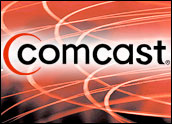
In a move sure to renew debate over how broadband access should be sold, Comcast is reportedly mulling a cap on how much data a customer buying its basic high-speed Internet access package can use each month.
Comcast, the No. 2 provider of high-speed Web access in the U.S., would establish a preset monthly data usage level and then charge a fee for users who exceed that level.
Reports of the possible move first appeared Wednesday on the BroadbandReports.com Web site.
Comcast did not return calls seeking confirmation or comment on the published reports of the shift.
Setting Limits?
Currently, Comcast’s basic high-speed Internet access packages has no limits on how much bandwidth a subscriber can use during any given month.
Cable companies are saying a new approach is needed as the bandwidth-hogging applications such as movie and music downloads gain in popularity. Fellow cable provider Time Warner is on track to test a tiered broadband menu later this year, offering users who expect to download more than the standard amount of data the ability to choose higher ceilings.
Comcast has long had a central role in the debate over how bandwidth is allocated to a user base, having been accused of slowing down user connections to peer-to-peer networks.
Growing Trend
Comcast already monitors users’ monthly download rates, and has contacted those who exceed by a large amount the average use level, asking them to reduce their levels of downloading or face cancellation. Such power users are likely downloading dozens of movies or thousands of songs per month or playing bandwidth-hogging interactive games for hours at a time.
Under the new plan, Comcast would reportedly charge users who go over a monthly cap of 250 gigabytes based on usage above that level, tacking on another US$15 for every additional 10 gigabytes they use.
Time Warner’s approach, to be tested in a trial in Beaumont, Texas, will be to offer users plans at different levels. For instance, a 5 GB per month plan might cost $29.95, and a 40 gigabyte offering amount to a $54.95 charge. Users would also have the ability to check their own usage levels, and to buy more bandwidth if they exceed their cap.
The new approaches are likely to receive a rocky reception from subscribers, who have been conditioned to expect that a single monthly fee buys them all the data they can consume, said Gartner analyst Phil Redman. That’s true even though all but the most voracious Web users currently stay well below that 40 GB per month level.
Most cable and phone companies now offer various plan levels based on how fast a connection can be, not how much data is downloaded. “Consumers have been trained to expect to be able to download until they drop,” Redman told the E-Commerce Times. “This is going to take some massaging and time to [get] people used to the idea.”
Genie Out of the Bottle
A model for the switch may be wireless subscriptions, which typically involve a monthly limit on minutes used or data sent or received before overage charges kick in, but users have been conditioned to treat wired-phone and Internet services differently, Redman added.
The debate over net neutrality has often focused on whether cable and phone companies would relegate other companies’ Web services to second-class status by giving their own content and services the right of way on the information superhighway and letting the services of others — such as Google and Yahoo — through only when there’s plenty of open road.
However, even charging users based on how much Internet data they download could have a profound impact on how users interact with the Web, Forrester Research analyst Charlene Li told the E-Commerce Times.
Users might spend less time online overall, which could impact the advertising-funded businesses of online services companies such as Google. Comcast and Time Warner are moving slowly toward the new approach in part to allow users time to absorb the coming change, she said, and the companies will be watching closely for signs of revolt among subscribers in the form of defections to rivals.
In fact, one risk for the cable companies is that by trying to preserve their bandwidth, they push users to competitors, such as phone companies with newer fiber-optics networks that could continue to offer unlimited plans.
“Even the users who don’t come anywhere near a monthly limitation may be inclined to go with a provider who offers all-you-can-eat,” Li commented.






















































Social Media
See all Social Media